I love coconut water! When I’m traveling in the tropics, there is nothing better than drinking water straight from a coconut. Mother nature designed the perfect vessel for a drink that is so refreshing, slightly sweet, and keeps you hydrated in hot climates. You’ve probably heard that coconut water makes an excellent hydrating drink that replenishes electrolytes and can replace nasty chemical-filled Gatorade and Powerade – but there really is more to it than that. How do you buy the healthiest coconut water and avoid the worst?
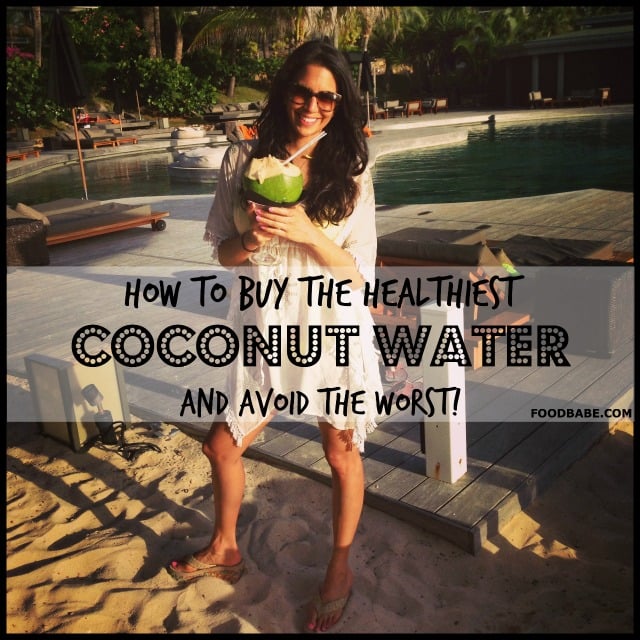
Coconut water is one of the healthiest drinks on the planet
Coconut water contains a unique combination of B vitamins, vitamin C, micronutrients, and phytohormones that are exceptionally beneficial to your health. A scientific review of coconut water, published in the journal Molecules, highlights some of the ways that coconut water replenishes your body:
- Helps to prevent heart attacks
- Lowers high blood pressure
- Can have anti-aging effects
- Fights free radicals to help prevent cancer
- Contains trans-zeatin which can be used to treat Alzheimer’s disease or dementia
That being said, I don’t want you to think it’s okay to pick up just any coconut water off of the shelf. Packaged coconut water is really flooding into the market recently. You can find it in bottles, cartons or powdered, frozen, flavored, carbonated, and sweetened. With all these choices it can be confusing and difficult to know if you are choosing the best one.
It usually costs at least $3 bucks a bottle, so it’s not exactly affordable- and if I’m going to spend my hard earned money on some, I make sure it’s worth it! Primarily, I look for coconut water that is the least processed and still has the majority of its nutrients intact. This is always going to be directly from a fresh coconut – but, of course that’s not always available. If you haven’t already heard, Pepsico and Coca-Cola have their own versions of coconut water – (O.N.E., Zico, Naked) – and you can only imagine what the corporations have done to it.
How To Ruin Coconut Water
Using a concentrate instead of fresh juice: Some coconut water companies get away with saying their drinks contain “100% Coconut Water” that’s “All Natural” even though it’s made from a reconstituted concentrate. Just like other juices in the store, they heat fresh coconut water and reduce it to a syrup. It’s cheaper for them to import this coconut water syrup, which they later add water prior to packaging. Any juice that has been heated to this extent loses a significant amount of its nutrients and its beneficial enzymes are denatured (i.e. the enzymes don’t work anymore).
Taking water from mature coconuts: This is a biggie. Young coconuts on the tree are usually green with an abundance of water in the center that is full of nutrients. Anyone that drinks coconut water straight from a coconut is drinking out of one of these young coconuts. As they begin to age, the nutrients in the water begin to seep into the meat of the coconut, and the water becomes less nutritious. It’s essentially watered-down. This also happens when young coconuts are picked and allowed to lie on the ground in the sun, for an extended period of time. While older “mature” coconuts might be used to make coconut oil, coconut milk and other coconut products, the coconut water from older coconuts is often discarded because it’s lacking nutrients and doesn’t taste the same. As the popularity in coconut water spiked recently, companies realized that they could buy up the water from mature coconuts and could get it cheaper than young coconut water. This is why it’s important to drink young coconut water and not get scammed into drinking the watered-down and less nutritious version.
Adding “natural flavors” or sweeteners: Young coconut water is refreshing and sweet, so there is absolutely no need to flavor or sweeten it – unless you are trying to hide something. Guess what happens when they use mature coconuts for their water? It tastes acidic, so they mask this taste with natural flavors or sweeten it up with sugars. I’ve heard that some companies use a centrifuge system to remove the acidic taste, but it’s a safe assumption that if you see a plain coconut water on the shelf with any natural flavors or sweeteners added it is from mature coconuts and not worth your money.
Pasteurizing it with heat: Coconut water is very delicate, naturally perishable, and should be kept cold. Have you ever stopped to wonder why most bottled and boxed coconut waters on the shelves aren’t in the refrigerated section? I recently checked out one of these bottles and noticed it didn’t expire for 2 years! This is because most coconut water at the store is heat pasteurized, which literally means that it’s been cooked to a very high temperature to kill bacteria and extend its shelf life. It has been shown that heat also destroys some of the vitamins, minerals, and phytonutrients and also denatures enzymes – stripping its benefits and much of its flavor. If coconut water is from concentrate, this would be the second time it’s heated. Obviously, your best bet is to seek out and find unpasteurized raw coconut water. This can be hard to find, but there is another way to kill bacteria while keeping the nutrients intact: HPP (high pressure processing). Without using heat, HPP is best way to preserve the goodness in coconut water, while extending its shelf life a little to make it more available commercially.
Dipping whole coconuts in formaldehyde or sodium metabisulphite: It’s been reported that some non-organic coconuts may be preserved for transport to the U.S. by dipping them in chemicals, including formaldehyde a known carcinogen. This leads to the possibility that these chemicals seep into the coconut meat and poisons the water. Some of my favorite organic cafes avoid this by getting frozen coconut water shipped directly to them.
We called up several of the most popular coconut water companies and asked where they source their coconuts (young vs. mature), if they dip them in chemicals, how they pasteurize them, and about additives and preservatives that they may use. We got a variety of responses, and it’s almost surprising to me how much some of these companies have screwed up something as basic as coconut water. I found several brands to avoid, because they are so heavily processed that the final product barely resembles natural coconut water.
Coconut waters to avoid at all costs:
Naked Juice Coconut Water – Although it’s not from concentrate, Naked told me that they use “mature” coconut water that is flash pasteurized with heat. The plain variety doesn’t have any additives, but all of the flavored ones have added natural flavors. This is also a Pepsico brand – a company that spent over $4 Million dollars to fight GMO labels – so they aren’t getting any of my business.
O.N.E. Coconut Water – This is another Pepsico brand that is flash pasteurized with heat. The flavored waters “with a Splash of Fruit Juice” contain natural flavors and “sugar” as an ingredient. As it doesn’t say “cane sugar” on the label, this could very well be from GMO sugar beets.
Pepsico told me that they couldn’t confirm whether their sugar is GMO because:
“the exact source of the sugar in our coconut water cannot be confirmed because we source our ingredients from around the world and that information is not available at this time. Please know that all of our products comply with all applicable food laws and labeling requirements. O.N.E. Coconut Water relies on the regulatory agencies charged with safeguarding our food supply when sourcing ingredients for our products”.
They are relying on the FDA’s regulations to protect us, although the FDA themselves say that the manufacturer is responsible for ensuring the safety of the ingredients used in their products, including GMOs.
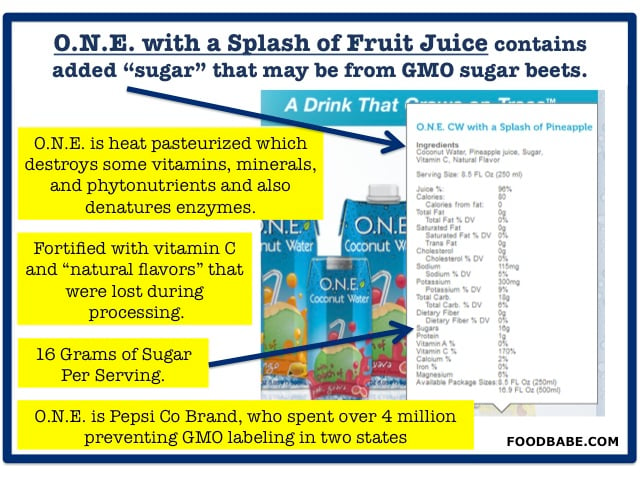
Zico – They sell two entirely different coconut waters depending on which packaging you choose. The waters in the bottles are made from concentrate and are a “blend of Asian coconuts” with natural flavors added. On the other hand, the ones in the tetra-pak cartons are not made from concentrate, have no additives, and contain only Thai coconut water that is packaged in Thailand. A bit confusing, isn’t it? While the tetra-paks (boxed) seem like a good choice, they use “Ultra High Temperature Pasteurization” to give it a long shelf life. This means it’s heated well above boiling point to 280 degrees Fahrenheit, which “kills everything” according to Scientific American, including beneficial nutrients. Plus, in case you didn’t hear the news, they were recently acquired by Coca-Cola – a big supporter of GMOs who have spent over 3.2 million to prevent GMO labeling.
CocoZona – We called and emailed them on several occasions, and they never replied to any of our questions – not even a peep! I always find it alarming when a company refuses to stand behind their product and isn’t transparent about their practices, especially since some companies have been caught lying about what’s really in the bottle. So, at this point, we know little more than what’s printed on the bottle of CocoZona, and the ingredient list reveals that it is made from concentrate. That’s enough reason to stay away from it.
Vita Coco – Don’t be fooled by all of those celebrity endorsements! Their waters are not made from concentrate, but they are all pasteurized with heat. Many of the flavored versions contain added sweeteners and the Cafe versions contain carrageenan. Even the seemingly plain 100% pure version contains added “fruit sugar.” Watch out for their coconut waters targeting kids, which are loaded with added sugar and many different natural flavors – they are not 100% coconut water! According to their website, Vita Coco Kids is also ultra high temperature pasteurized.
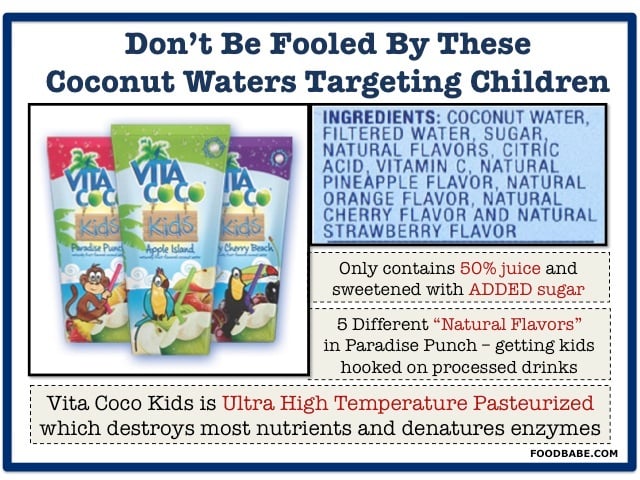
GOYA – This brand is heat pasteurized and contains added preservatives. Some versions are sweetened with sugar, which may be GMO. Because I vote with my dollars, I avoid any GOYA brand product as they spent over $56K to fight GMO labeling in California.
C2O – They told me they heat pasteurize their water up to 120 degrees celsius once the product is in the can for as long as 5 minutes. Although, they use no additives or concentrates, the length of this high heat processing puts it squarely on my avoid list.
Purity Organic – It’s made from concentrate and flash pasteurized with heat, so some of the goodness has been destroyed. It’s organic I know, but not all organic products use the best practices!
Coco Libre (Organic) – It’s made from concentrate, flash pasteurized with heat and has added “natural flavors.”
How do other popular coconut waters stack up?
Munkijo (organic) – This water isn’t from concentrate, contains no additives or added sugars and their young coconuts are sustainably grown and harvested. But I’m sorry to report they also use ultra high heat pasteurization to process their waters, so it’s far from the best on the market.
Coco Hydro by Big Tree Farms (organic) – I really like Big Tree Farms’ mission geared towards sustainability. Their unique version of coconut water is powdered and comes in packets that travel easily. So, there is no pasteurization involved, you just add water to reconstitute it. However, the process they use to evaporate the water uses heat, so it is not considered raw and some of the nutrients may be destroyed in the process.
Taste Nirvana (organic) – No concentrates or additives in this brand, and their young coconuts are sustainably grown, harvested and organic (though not labeled as such). I really like how it’s packaged in glass bottles. They are the only company that told me they use a “steam sterilization” process which is a combination of steam and pressure.
Amy & Brian (organic) – Other than the fact that they flash pasteurize the water, all other aspects are good – no additives, no added sugars, no concentrates. They also told me that their young coconuts are not treated with any chemicals or pesticides. I have to admit though, I’m not a fan of the cans they are in, even if they are BPA-free.
Harvest Bay (some varieties are certified organic) – They flash pasteurize their water for about 2 seconds at 120 degrees, and it’s not from concentrate. Some of their waters are now organic, and they are all non-GMO project verified. Although they add no sugars or additives to their plain version, most flavored varieties contain added sugar or natural flavors, so I’d avoid those.
Whole Foods 365 – They confirmed they don’t use a concentrate, however they heat pasteurize their water which comes “from around the world depending on availability”. Their water is also packaged in cans, which I don’t like!
Trader Joe’s – Their water is not from concentrate, but it is pasteurized. I have yet to hear back from them in regards to how they pasteurize their water (whether they use flash or ultra processing). They fortify their water with added vitamin C, which is a red flag that it has been heavily processed.
My top picks for packaged coconut water:
***This chart contains examples of the coconut waters we researched, however, there are many more available on the market or may be available in your neck of the woods. Please use this post as a guide to find the best coconut water in your area.***
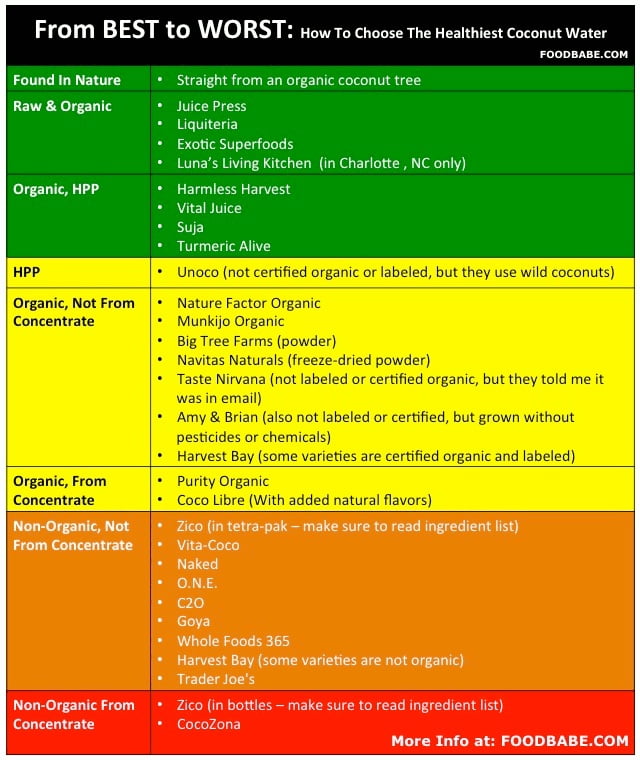
While the best coconut water is straight from a young coconut picked from a tree, these packaged waters below are as close to the real thing as you can get. They don’t use any heat processing or concentrates, so they aren’t cooking your coconut water. Some of them use HPP to kill bacteria, and a couple of these brands serve it up completely raw and unpasteurized.
Harmless Harvest (organic) – I’ve written about this brand before, and it’s no secret that they are my favorite. I had the pleasure of meeting with the founders of Harmless Harvest and I’m blown away with how open and honest they are about everything. They’ve become a success not because of marketing, but because of their good practices. In fact, they hardly spend any money on marketing at all (and bloggers are not compensated either). They source their young coconuts from small organic agroforestry farms that pay a fair wage to their workers. The coconuts are then frozen and shipped to the U.S. for packaging, after which they use HPP processing to kill bacteria and extend the shelf life to 60 days. Because it’s so minimally processed, some of the waters turn pink when the naturally occurring antioxidants or phenols are exposed to light – and you won’t find this in pasteurized coconut water. You can find this at Whole Foods and most natural food stores in the refrigerator section.
Juice Press (organic) – This water is totally raw. It’s not pasteurized or processed with HPP. Their coconuts are shipped frozen to the store and then they ship it fresh to you with a 3 or 4 day shelf life.
Exotic Superfoods (organic) – Another fave, this water is 100% organic and raw. It is not processed with any heat or HPP – but it’s kept frozen to preserve freshness.
Liquitera (organic) – This bottled raw coconut water is also organic, without any pasteurization. It’s only available at their stores in New York.
Vital Juice (organic) – It’s never heated or frozen, and it’s preserved with HPP, 100% organic and non-GMO project verified. It is currently only available at stores in Washington and Oregon with plans of expansion, and you can also order it online on Amazon.
Unoco (wild coconut) – Made from wild coconuts (not from a plantation) and processed with HPP without any additives. It’s only available in California right now.
Suja (organic) – Suja makes a coconut water blend, Tropicaloe, which is made from freeze-dried coconut water mixed with pineapple, apple, aloe, lime, mint and spinach juices, all preserved with HPP. This juice is exclusively sold at Whole Foods stores.
Keep in mind that while I think coconut water is amazing, I don’t drink it every day, I use it as a treat or on days I am very active and sweat hard!
If you know someone who loves coconut water or needs a great substitute for soda, Gatorade, Powerade or other unhealthy drinks – please share this post!
We must educate as many people as possible about their choices to change the marketplace. When we change the marketplace and start spending our money on the best and safest brands, we change the world!
Xo,
Vani



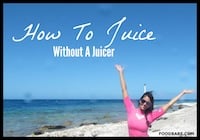
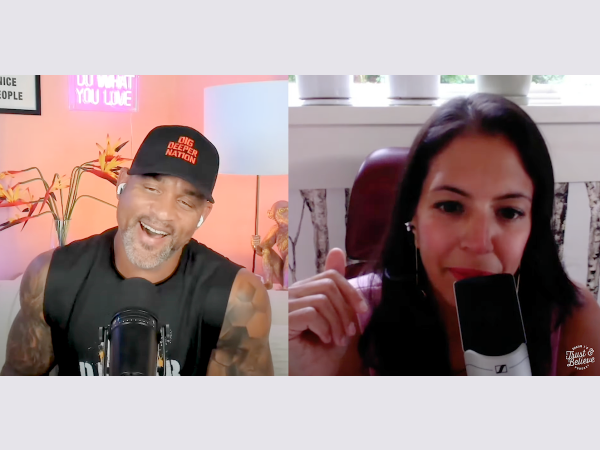



Isnt freeze dried processed? Seems like enzymes would also be denatured?
EVOLUTION does not use heat/pasteurization, they use high-pressure.
Grace is one of the biggest brand in the Caribbean. Would love to know about its product.
Grace foods are healthy!
How about Trader Joe’s coconut water? Is Trader Joe’s OK?
Why would you recommend drinking coconut water at first place? I think it is great, if you live in a tropical region and coconuts are grown in front of your door. But living in the US?! There are local produce like apples or pears which make an equally nutritious drink. Looking at the composition of coconut water, I can’t find anything special about it. It consists of mostly water, some sugar, some acids, is high in potassium and low in sodium. Any fruit juice has basically an equal composition. Also, I can’t see a compositional difference between the water from young and mature coconuts.
My take, I skip that stuff and invest my hard earned money in something else.
That is a great article thank you. People are waking up and really starting to pay attention to where they are buying from. One brand you forgot to mention is Earth Coco. They do an amazing raw coconut water in California, probably the freshest taste I have tried. They are also conscious company helping children and Typhon victims in the Philippines. Have you ever heard of them? http://www.earthcoco.com
I live in Canada and we buy Silk brand coconut water to replace our cows milk. The carton says non GMO project certified, so does that make it a good one or not? It contains carrageenan and “natural flavours”:/ so is that a red flag?
I think you mean coconut milk, not water. Silk doesn’t make coconut water.
Yes that’s what I meant.
carrageenan is a red flag stay away
Electrolytes are chemicals too you know. In fact, everything is made of chemicals, including you. What you really want to avoid are the TOXIC chemicals.
A long name or a funny spelling don’t make a chemical toxic. Nor does being made from toxic chemicals – water is made of hydrogen and oxygen, an explosive mixture as gases. Table salt is made from sodium and chlorine, both lethally dangerous on their own.
How about Sun Tropics Coconut Water from Costco Canada?
Sun Tropics is one of the very best I have every had. Too bad Costco stopped carrying it. I wish they would bring it back.
What? More deletion?
What’s wrong Quck Babe?
Don’t have as much control over your website here as you do on Facebook?
Takes a little longer to delete or block anyone who actually asks a resonable question instead of bowing to your almighty nonsense?
Energy should be used to lift people not bring people down. I hope you find a focus that shares positive words to lift others and not hang out where you feel everyone is wrong. If this is not for you, move on to where you can spread cheer to others and you will find yourself a little happier too!!
Hi Food Babe!
I had my first taste of the Harmless Harvest coconut water. I must say, it was amazing and I can taste the difference between coconut water that has been pasteurized. I was lucky to get the pink one too. However, the Harmless Harvvest company uses plastics that is PETE Recyle Code 1, which leaches plastic. It would be great if they can use better plastic, perhaps upgrade to a #2 HDPE and/or #4 LDPE which are more food safe.
Hello FoodBabe:
I appreciate this article very much and can only imagine the amount of time and work invested in investigating all of these many companies and formulas. I am now *very* interested in picking up some “Harmless Harvest”.
I only wish that I saw this blog yesterday before my trip to Whole Foods, lol — but I’ve made a note and have put Harmless Harvest’s coconut water on my shopping list.
You do an amazing job! Thank you for inspiring me. 🙂
Laura
I just found Harmless Harvest at Costco!
I picked up Real Coco on sale at my local Winnco for a whopping 98 cents. it says no preservatives and never from concentrate…. but when things say 100% all natural, i can’t help but to think they are hiding something.
This made me so happy. thank you for all your research and time you’ve spent into this. I knew every time i read Zico’s brand or vita coconuts brand that there was something off about it. I had no bases, but you explained them fully! I was going to attempt to buy zico by the bulk until i saw this and found i could buy two different brands (which were interestingly hard to find when searching for coconut water) of which i can buy online now. thanks again!!!!
-Sarah
How about Blue Monkey? Brand
What about Blue Monkey brand?
can I just say it bugs me to no end when people ask a question that is clearly answered in the article/post? why not try reading the entire post FIRST before you ask your question!
Hi Vani,
I am trying to find a whole coconut wholesaler rather than selling pre bottled coconut water. I have found one person but find cutting in to them quite difficult. Can you offer any brand suggestions that might be a good option? Even ones that pre drill a hole for a straw?
Thank you very much, your posts are brilliant!
FYI, Juice Press actually buys their coconut water from Exotic Superfoods. They then rebottle it and sell it like it was their own. Not so. My mother worked for Juice Press, in their purchasing department. Hence the inside info ^_^
From http://ntp.niehs.nih.gov/ntp/roc/twelfth/profiles/formaldehyde.pdf:
“Numerous formaldehyde-based chemicals may be used as components of adhesives and coatings in
packaging, transporting, or holding food provided that conditions prescribed in 21 CFR 175 are
met.
Numerous formaldehyde-based chemicals may be safely used as articles intended for use in contact
with food provided that conditions prescribed in 21 CFR 177 are met.
Numerous formaldehyde-based chemicals may be used in the production of paper products intended
for use in producing, processing, preparing, treating, packaging, transporting, or holding food
provided that conditions prescribed in 21 CFR 176 are met.
Formaldehyde and formaldehyde-based chemicals may be used as adjuvants, production aids, and
sanitizers that come in contact with foods provided that conditions prescribed in 21 CFR 178 are
met.
Formaldehyde-based ion-exchange resins may be used in the treatment of food provided that
conditions prescribed in 21 CFR 173 are met.
Formaldehyde may be safely used in the manufacture of animal feeds in accordance with conditions
prescribed in 21 CFR 573.460.
Formalin, containing approximately 37% formaldehyde gas by weight, can be used in environmental
waters for the control of fungi and parasites for certain finfish and shellfish as prescribed in
21 CFR 529.”
SO GLAD the FDA/USDA allows formaldehyde to be used as an acceptable animal feed product… Wow. Good thing I’m veg now.
This is an awesome page on Coconut Water! You clearly have done your home work. I love how you name the products which yes are really organic. Whole Foods carries Harmless Harvest. Anything sold with Pepsi and Coke should be avoided. Yes they have spent 100’s of Millions against GMO Labeling!
Thanks for the Great page and here is to living a fun Healthy Life!
Can you tell me if Badia coconut water is okay? I drink a lot of this
Not sure who sent me an email saying I am a “Sheep”? you will need to do research on the FDA, Monsanto, and then the history of these companies like Coca Cola and Pepsi before you can think you are a know it all in the Food Industry.
Other then that this post would be much much to long.
Have a good day. Eat Healthy and try to reach a higher vibration in life.
Love this article!
Do you have any information on coco zia ?
what about Wai Koko? It’s a local brand in Hawaii that I have been buying because it’s local. But they are also selling via Amazon. Would love to hear your take on this brand so I can decide whether I need to switch or not. Thanks!!!!
To each their own! Then you have notning to concern yourself of this matter! Why u swet it?
I got harmless harvest from whole foods… they sell it by the case. I bought one and gave it to my husband after the first bottle he was sold. I had to limit him to one a day or he would drink 4-5 or more a day. at $5 a pop, too much for our budget. Thanks again for info and you are appreciated here in Northern California!!!
Amy and Brian and Taste Nirvana are NOT ORGANIC!!!
You should try Invo Coconut Water. It is Non GMO, HPP and made from organic coconuts, (will be USDA certified within the next year) They don’t freeze the coconuts like HH does. Instead they ship them in refrigerated cargo trailers so they never freeze or get hot. Literally the best I have ever tried.
Ajali. I was so excited when I saw Invo because it touted being raw and HPP’d but to be honest it tasted weird. I can’t put my finger on why. It just had a strange taste like it had been processed or like it was about to go bad or something.
While its possible that the taste might have gone off (especially if it has been more than 60 days since the date of bottling, or if stringent storage standards with regards to cooling haven’t been met), I can assure you from drinking dozens of these from all over shops in London that the quality and taste profile of the product is probably second to none from amongst all the brands currently available in the UK. You should buy and drink with confidence as long as all the storage requirements have been met.
What about the Kirkland brand coconut water?
Let me know if you find anything about this. I have the same question.
I read your article on coconut water. So I called stores trying to find where to
Purchase harmless harvest coconut water. Found a store in my city. I talked to
The dept to see if in stock , he said yes. Told me price and sizes. Also said
Be careful. China and Thailand have contaminated water and china for 2 years
Have not ate any grounds foods including coconuts. I then looked up
Thailand and said had lots of rivers and water bad contamination. How does
That effect harmless harvest and all the other Thailand coconut waters ?
Is there a good coconut water possible organic not from Thailand and waters in
country not contaminated ?
Thank you. ROZ
Any comments on Koh Coconut?
You left out Ero Grove. I dont know if they are as big a company as Harmlss but they are a really good 100% Organic Raw coconut water option. I used to buy HH regularly but switched to Ero Grove. There’s is raw, organic, unheated etc. but it just tastes WAY fresher. They are kinda similar to HH but I always find them to be more refreshing. Anyhow, just thought I’d share that with you. Thanks for the awesome review.
What about Jax Coco with Chocolate? I just fell in live with this! Hoping to buy a case soon 🙂 please let me know!
Coconut (Does it need to be bought Organic?)
You won’t see coconut on any Clean 15 or Dirty Dozen lists anytime soon, because the general public has yet to catch on to its fatty, nutty delights. That said, we Primal people eat coconut. We sauté with coconut oil and slather it onto vegetables, sweet potatoes, hair, skin, and armpits. We drink and make curries with coconut milk and cream. We obsess over coconut butter, paying tribute to its glory with a greasy spoon. And when we’ve been running or training particularly hard – or it’s hot out – we often reach for the coconut water. We like our coconut, so it’s in our best interest to determine whether we should be buying organic or not.
Luckily for us, it doesn’t look like organic coconut makes a big difference. Several studies have looked for pesticide residues in coconut products and come up virtually empty handed. There’s this 2008 study, which was unable to detect any pesticide residues in crude coconut oil. Poly-aromatic hydrocarbons, which are generated during the coconut flesh quick drying process and are carcinogenic, were detected in crude coconut oil but were removed in the refining process. Virgin unrefined coconut oil, then, may still contain these hydrocarbons, unless it’s wet-milled and processed without quick-drying the flesh. That goes for both organic and conventional coconut oil, to be clear.
In another study, researchers examined 15 samples of coconut water using two different methods of pesticide detection and were unable to detect any of the 11 pesticides they were looking for.
Coconut milk is also going to be as free from pesticides as any other coconut product. Since it’s made from fresh flesh, not the dried, heat-treated stuff, coconut milk should also be free of poly-aromatic hydrocarbons.
Read more: http://www.marksdailyapple.com/7-foods-you-dont-need-to-buy-organic/#ixzz3ArwUTMcN
After reading this article, I haven’t bothered with Coconut water. I will live without it! And live better, I might add.
Thanks Food Babe for all of your hard work helping us help each other stay healthy!!
I am little confused with Liquiteria inclusion under raw and organic; how is it different from Harmless Harvest.
If I am not wrong – cold-pressed is another name for HPP. Liquiteria mentioned bottles are cold-pressed.
Cold-Pressed = HPP = Bottles kept in cold bath and applied with high pressure.
Can anyone tell me what a good HEALTHY coconut water available in Canada is? I really want to try coconut water because there is not a lot of flavored water for me to drink as a diabetic. I appreciate the help
I live in Vietnam and am married to a woman that was born in the province where coconuts trees are plentiful. This province is widely recognized throughout the country as having the highest quality coconuts grown.
Almost everything there evolves around coconuts. I go out in the yard and take young coconuts off the tree to drink 3 or 4 daily whenever we visit her parents house and I can attest that the taste is unlike anything I have purchased here in the United States.
This leads me to ask is there an opportunity for us to get involved in this business. She has the ability to work with the local people and I have the ability to work with buyers using clear English.
Thank you so much for doing all the legwork. I appreciate it xxoo Laura
Great article! I know how hard it is to research and compile all this info so I truly appreciate it.
Harmless Harvest is the best bottled coconut water I’ve personally tried.
Any thoughts on Waiola Coconut Water? http://waiolalife.com/
What about GoodBelly brand?
Hi Vani,
Can you advise where the brand Real Coco fits in your spectrum of safe coconut water? (http://www.realcoco.net).
Much appreciated.
How do you rate CocoZia?
Know anything about Kirkland Brand Coconut Water?
Great article! Coconuts found in nature truly are the best. Check out http://www.carmelaliving.com for a coconut opening tool that makes enjoying the health benefits of fresh coconuts easy!
I am so excited for you Food Babe! You are making a difference and you always have a beautiful smile on your face. It goes to show that people can make a difference without being hateful and being jerks.
I know the coconut water is pasteurized at Whole Foods but I just purchased a big paper container of 365 Coconut water and it says the origin is Thailand.
At Whole Foods, a local baker was sharing samples of her bread and guess what…it was non-GMO! OK, maybe every ingredient she uses is not 100 percent non-GMO but at least people are making the effort. I asked how she can charge less for NON-GMO products and she said they eat the cost. The bread costs less than Harris Teeter and her bread is fresh, non-GMO and Harris Teeter’s bread is shipped frozen AND GMO.
At the farmers market, my source for eggs is now using non-GMO feed. It has taken several years but we finally got the farmer to use Non GMO feed.
Things are changing slowly but surely. We all can make a difference. Thanks Food Babe!
Opps!!! I just looked at the Coconut water I purchased at Whole Foods and it is not labeled Organic. For some reason I did not look for the Organic label.
what about badia brand please?